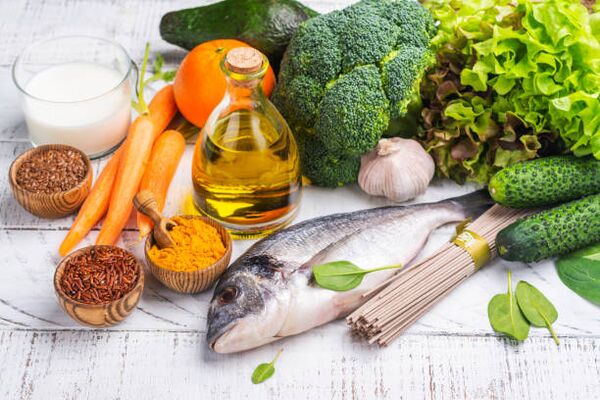The list of foods forbidden for psoriasis includes salt. Consumption is limited because it not only irritates the digestive system, but also "draws" water, which leads to latent edema, weight gain and aggravation of pathological processes in metabolism.
In addition to adversely affecting the gastrointestinal tract and nervous system, spices and spicy foods that adversely affect the skin (aromatic substances and essential oils), causing itching and inflammatory reactions in the skin are excluded.
Digested carbohydrates (sugar, honey, sweets, etc. ) also cause inflammation and help to lose weight. Products containing preservatives, dyes, stabilizers and flavor enhancers should be excluded: they cause allergic and inflammatory reactions.
You should avoid eating fatty foods that increase lipid metabolism disorders, "add" extra weight, "inhibit" the work of the digestive system.
List of banned products:
- pastries, especially fresh ones, white bread, butter biscuits;
- rich meat soups;
- fatty meats (especially pork), lard, sausages;
- smoked fish, meat, canned food;
- condiments (garlic, horseradish, vinegar, pepper, cloves, nutmeg);
- fatty dairy products;
- citrus fruits (a controversial topic, some nutritionists welcome them, some are prohibited);
- seafood (crab, crab, shrimp, mussels, oysters);
- highly allergenic fruits and berries (strawberries, pineapples, melons, strawberries, strawberries, mangoes, cranberries);
- vegetables (potatoes, tomatoes, squash, legumes, eggplants, bell peppers);
- coffee, cocoa, chocolate;
- protein and fat creams, jams, honey, sweets;
- nuts, especially roasted and salted;
- eggs;
- easily digestible cereals (semolina, barley);
- sakatat
Need to follow a diet
A patient on a psoriasis diet will soon experience a significant improvement in skin condition, a decrease in the frequency of relapses, and a loss of itching and discomfort. In addition, nutritional treatment helps to normalize weight and the functioning of the digestive system, improves the appearance of hair and nails, and stimulates the immune system.
Why do you need a diet for psoriasis?
After eating, complex biochemical processes are triggered to break it down and assimilate it. The pH of the body depends on the composition of the food. When proteins are metabolized in tomatoes, eggplants, meat and fish, the environment becomes acidic. This is what often causes the next psoriasis to recur. Therefore, the removal of such products will help to prevent the appearance of characteristic pink plaques covered with silver scales on the skin. Compliance with a diet for a long time leads to significant development in the body. Here's how:
- metabolism is normalized;
- increases the body's immunity to the effects of external and internal negative factors;
- sleep quality improves, vitality increases, apathy and fatigue disappear.
There is a certain allergic component in the pathogenesis (mechanism) of the development of psoriasis. Even the symptoms are similar to the typical signs of sensitivity - the skin becomes inflamed, irritated and rashes appear. Thus, it is advisable to eliminate foods that cause allergies. For example, chocolate, strawberries, citrus fruits.
Healthy foods
Any fermented dairy products are good for psoriasis, but low in fat. Nutritionists advise patients to use soft cheeses without spices, varenets, fermented boiled milk, yogurt, kefir more often. In the diet of children should definitely drink cottage cheese and colorless and tasteless yogurt. In addition, the weekly menu should include the following products:

- boiled egg or omelet;
- lean meats - turkey, rabbit, chicken breast, lamb;
- oily fish - salmon, Norwegian herring, sardines;
- dry grain bread;
- cereals - buckwheat, millet, wheat, corn;
- seasoned with white cabbage salads, parsley beets, any vegetable oil;
- pumpkin, greens and celery roots, carrots.
Dishes should not be fried or broiled. Cook or cook in a little water. Steamed vegetables, meat or fish contain as many nutrients, macro and micronutrients, fat and water soluble vitamins as possible.
Nutritionists recommend eating fruits and dried fruits as a dessert. Figs, dried apricots, pineapples, grapes, cherries, peaches, dates are especially useful for daily use. Of the citrus fruits, only grapefruit is allowed. Peel a squash, grate it and squeeze the juice. Do not forget the nuts (walnuts, cashews, peanuts, hazelnuts), pumpkin and sunflower seeds. They perfectly alkalize the body, minimizing the risk of recurrence of psoriasis.
Basic nutrition rules
The goals of following a diet for psoriasis are:
- reducing the number of exacerbations of the disease;
- decrease in the frequency and intensity of skin rashes;
- normalization of metabolism;
- stimulation of the body's defenses;
- improving the functioning of the digestive tract.
According to the classification, the diet for psoriasis does not have "its own table", ie it is necessary to follow a general diet or treatment table number 15.
In case of exacerbation of the disease within a few days, a hypocaloric diet with puree is recommended. The daily energy value is 1800 kcal, the amount of protein - 50-70 grams, fat - no more than 40-60 grams, carbohydrates - about 250-300 grams. Excretion of allergenic foods is also indicated.
Each person's body is individual and therefore there is no clear restriction on the consumption of a particular food. There are many advanced diets for psoriasis, the most popular of which are the Pegano diet and the Fire diet. They are similar in that they try to regulate the acid-base balance in the body to stabilize the disease. That is, it is recommended to consume up to 70% of the daily diet of alkaline products and about 30% of acid-forming products.
General principles of diet for psoriasis:
- drink fluids; Free fluid intake should not be less than 2-2, 5 liters per day. Drinking plenty of fluids removes toxins from the body, normalizes kidney function, prevents the development of constipation and increases skin turgor.
- weight; Excess body weight indicates a deep metabolic disease, especially in lipids and carbohydrates. Since obesity disrupts the digestive and cardiovascular systems, it is important to normalize weight, not with excess weight and exercise. Weight normalization improves the condition of the skin, as the amount of C-reactive protein in the blood decreases, which increases with obesity.























